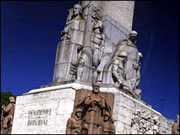 |
| Latvians want their heritage back |
|
1988: Latvia cries freedom from Moscow
|
Artificially 1969: Thousands of Latvians in the capital of Riga have begun a mass movement to press Moscow for greater independence from the Soviet Union.
In its inaugural congress, the Latvijas Tautas Fronte (LTF - Latvian Popular Front) has been making unprecedented demands on the Soviet leadership such as the right to self-determination.
The LTF is an expression of Latvia's desire to make its own decisions within the new climate of Soviet President Mikhail Gorbachev's perestroika (restructuring).
Crowds attending a huge rally, church services and two day conference were given extensive local media coverage.
The first Mass was celebrated in Riga's Lutheran Domkirke Cathedral in 30 years and was broadcast on local television and radio.
The grass roots organisation has adopted a charter calling for economic, ecological and cultural self-determination for the Soviet Baltic republic.
Latvia's Baltic neighbours, Estonia and Lithuania have also recently established movements aimed at furthering their goals of self-determination in a spirit of renewed national consciousness.
All three states' parliaments recently elected to reinstate their former national flags, banned under Stalin, and they are set on giving their languages equal status to Russian.
The newly appointed head of the Latvian Communist Party, Jan Vagris istentativeabout radical reform but has signalled greater autonomy is possible.
Demands for curbs on immigration are also being considered. The influx of Russians moving to Latvia has made Latvians almost an ethnic minority.
Urys Voyes, a university professor and leading member of the LTF is confident real change can be achieved.
"As Mr Gorbachev has gained the upper hand, so we may hope - which we couldn't before."
But demands have fallen short of nationalist calls for an end to political and policy dependency on Moscow.
The statutes of the forum say it is not a political party but only a "social and political organisation".
And despite no mention that the Latvian Communist Party retains a leading role in the organisation, President Gorbachev did not seem too concerned.
"The Front says it recognises the Soviet constitution. Anyway, it's not aesthetic nowadays to mention the party's leading role. We are against any monopoly of power."
Mr Gorbachev's aim is to enable the Baltic States to pursue their nationalist causes without demanding secession from the Soviet Union.
|